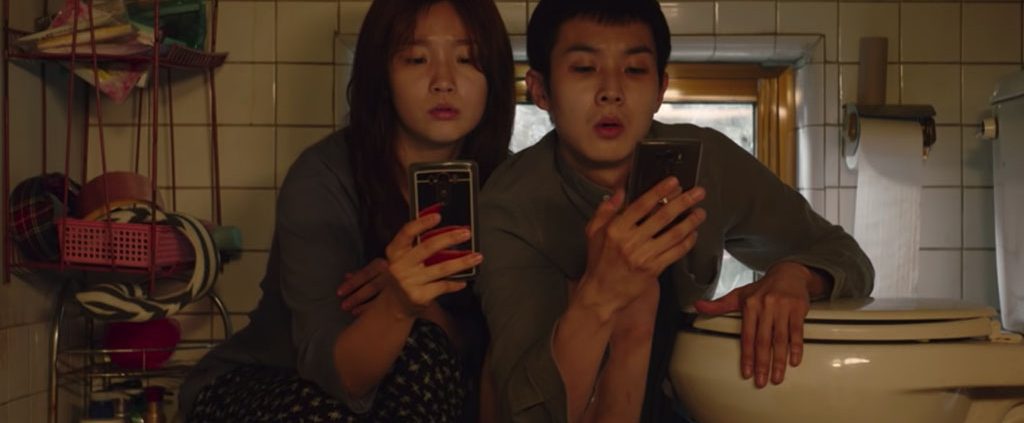Prejudice—The Parasite That Plagues Us All
Screenshot taken from Official Trailer
Written by Glen Wong, Singapore
Rating: 5/5
The 2020 Oscars proved that Asians are more than just successful doctors, lawyers, engineers, or mathematicians. Parasite, a South Korean film directed by Boon Joon Ho, made history as the first foreign language film to win four Academy Awards for Best Picture, Best Director, Best International Feature Film, and Best Writing (Screenplay)—prompting comments from a news reporter that director Boon Joon Ho didn’t just make a movie, but started a movement for Asian films to gain global recognition.
Parasite is a dark comedy that centers around the lives of the lower class Kim family, and the upper class Park family. When the Kims’ son, Ki Woo, gets a job as an English tutor for the Parks’ daughter, Da Hye, the Kims turn it into an opportunity to con their way into the Parks’ lives. The audience is brought on a roller coaster ride of hilarity and suspense as unplanned circumstances threaten to expose the Kims’ deceitful schemes.
As a former Sociology major at Yonsei University in Seoul, Director Bong Joon Ho crafted the film to showcase the themes of social stratification and the class divide. By shining a spotlight on the negative stereotypes of both the lower and upper class, Parasite highlights the inequalities found in social hierarchies today.
As I watched the interactions between the Kims and the Parks, it made me reflect on my attitudes and perceptions towards the poor. Am I fulfilling the negative stereotype of the upper or middle class? Am I insensitive to the poor’s struggles of making ends meet? Do I have prejudices against the poor?
Here are three forms of prejudices towards the poor in Parasite that caused me to look deeper into my own life:
1. The Poor are “Unethical”
Deception is the main motif of the film—which depicts the lengths that the poor would allegedly go to, in order to obtain a living, thus perpetuating the stereotype that the poor are criminals or deceptive.
This made me think about the occasions when I have been advised by family members and friends to not leave my valuables in the hotel, or to not be outside past 10 p.m., because the “maids”, or the “muggers” might steal from me.
However, the Bible tells us that the sin of deception knows no social class, but is a matter of the heart. Jeremiah 17:9 says that “the heart is deceitful above all things, and beyond cure. Who can understand it?”
Looking back at my own life, there were times when I had pulled strings to get what I wanted. When I was younger, my high school band participated in a “Battle of the Bands” competition. We ended up winning because we voted for ourselves. It is these little acts of deceit that remind me to withhold my prejudices and recognize the sin of deception in my own life first before I start looking upon others with suspicion.
2. The Poor are “Unhygienic”
The film contains some scenes with the Parks commenting that the poor “easily get sick”, or “have a smell”. The patriarch of the Parks even mentioned that he “does not ride the subway” because of this.
Likewise, I am also guilty of having similar thoughts about the “poor”. I remember having to visit an estate near my church that had the highest rate of urban poverty and mentally ill patients. As I have severe eczema, I feared that bacteria and bugs would be transferred onto my clothes, and start affecting my skin. It wasn’t until I started interacting with the residents there that the Lord helped me to see beyond their physical circumstances and focus on them as equals before the sight of God.
We need to acknowledge that all of us are sinners and unclean before the Lord, and none of us are any different from the other, but God loves us all the same. In response to His love, let us be continuously transformed by the renewing of our minds (Romans 12:2) so that we can see others, regardless of their social class, the way God sees them.
3. The Poor are “Unruly”
Throughout the film, the Kims are often seen cursing and engaging in unruly behavior. In one particular scene, we see the Kims invading the Parks’ residence while they were away, getting drunk, breaking beer bottles, and littering the living room. These portrayals reinforce the stereotype that the “poor” are uncivilized.
But the Bible tells us that it is not just what we portray on the outside that matters. In reality, we are all sinners who struggle with unruliness in how we think and feel, and none of us can live rightly without the help of the Holy Spirit. As the Apostle Paul mentions in Galatians 5:16, we are to walk by the Spirit so that we will not gratify the desires of the flesh, but live lives that are pleasing to God.
Even though it seems easier to cave in to the desires of our flesh or to live however we want to, let’s choose to walk in step with the Holy Spirit so that our lives will reflect God’s glory.
The Cure for Our Prejudices
The movie ended on a note that left me overwhelmed by how pervasive these societal issues are. It got me thinking: is there any hope for these characters? Are we allowing our prejudices to become a parasite that slowly eats away at our compassion and humanity?
It prompted me to think about how the gospel has shaped the way we as Christians view ourselves and one another—regardless of our status in society. Knowing who and whose we are can shed light on the prejudices we have of each other, and help us learn to relate to and honor each other as fellow image bearers of God. If not for anything, we as believers should lead the way in interacting with and serving the poor, sharing with them the good news about Jesus, regardless of how they might respond.
It’s a small act, but maybe it will be one step to stop this parasitical outbreak.











Parasitical outbreak is prominently severe in comfortable middle-class and arrogant upper-class.
Indeed, knowing who and whose we are can shed light on the prejudices we have of each other, and help us learn to relate to and honor each other as fellow image bearers of God. Jesus came to seek and save the weak, the lost, the broken hearted.